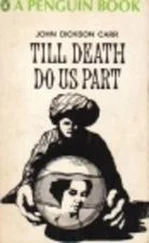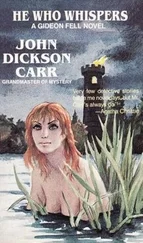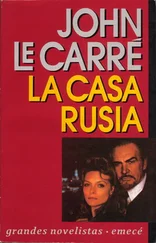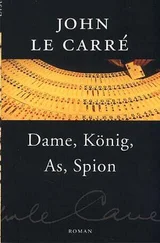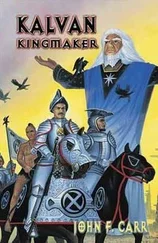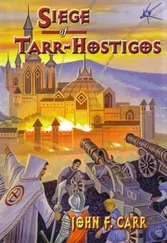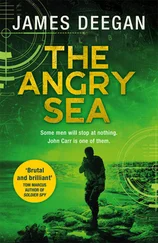‘And Quinn actually bought from him ? Or his company did?’
Laura takes another pull of her Meursault, shakes her head.
Toby tries again:
‘Was the stuff any good?’
‘It was expensive, so it had to be good, didn’t it?’
‘What’s he like , Laura?’ Toby insists.
‘Your minister?’
‘No! Jay Crispin, of course.’
Laura takes a deep breath. Her tone becomes terminal, and even angry:
‘Just listen to me, dear, will you? The scandal at Defence is dead, and Jay Crispin is henceforth and forever banished from all ministerial and government premises on pain of death. A strong formal letter has been sent to him to that effect. He will never grace the corridors of Whitehall or Westminster again.’ Another breath. ‘The inspiring minister whom you have the honour to serve, on the other hand, bruiser though he may be, has embarked on the next stage of his distinguished career, I trust with your help. Now will you please get me my coat?’
After a week of flailing himself with remorse, Toby remains dogged by the same question: If the scandal at Defence is dead and Crispin will never walk the corridors of Whitehall or Westminster again, then what’s the bloody man doing lobbying the House of Lords?
* * *
Six weeks roll by. On the surface things continue uneventfully. Toby drafts speeches and Quinn delivers them with conviction, even when there’s nothing to be convinced of. Toby stands at Quinn’s shoulder at receptions and murmurs the names of foreign dignitaries into his ear as they approach. Quinn greets them as long-lost friends.
But Quinn’s continued secretiveness drives not only Toby but the entire ministerial staff to the edge of desperation. He will stalk out of a Whitehall meeting – at the Home Office, the Cabinet Office or Laura’s Treasury – ignore his official Rover, hail a cab and disappear without explanation till next day. He will cancel a diplomatic engagement and not inform the diary secretary, his special advisors or even his Private Secretary. The pencilled entries in the diary he keeps on his desk are so cryptic that Toby can decipher them only with Quinn’s grudging assistance. One day the diary disappears altogether.
But it’s on their trips abroad that Quinn’s secretiveness assumes in Toby’s eyes a darker hue. Spurning the hospitality offered by local British ambassadors, Quinn the People’s Choice prefers to take up residence in grand hotels. When the Foreign Office Accounts Department demurs, Quinn replies that he will pay his own way, which surprises Toby since, like many affluent people, Quinn is notoriously tight.
Or is some secret benefactor perhaps paying Quinn’s way for him? Why else would he keep a separate credit card for settling his hotel bills and shield it with his body if Toby chances to come too close?
Meanwhile, Team Quinn is acquiring a household ghost.
* * *
Brussels.
Returning to their grand hotel at six o’clock in the evening after a long day’s haggling with NATO officialdom, Quinn complains of a nauseous headache, cancels his dinner engagement at the British Embassy and retires to his suite. At ten, after heavy soul-searching, Toby decides he must call up to the suite and enquire after his master’s welfare. He gets voicemail. A DO NOT DISTURB notice hangs on the ministerial door. After further cogitation he descends to the lobby and shares his concerns with the concierge. Have there been any signs of life from the suite? Has the minister ordered room service, sent down for aspirin or – since Quinn is a notorious hypochondriac – for a doctor?
The concierge is bewildered:
‘But Monsieur le Ministre left the hotel in his limousine two hours ago,’ he exclaims, in haughty Belgian French.
Now Toby is bewildered. Quinn’s limousine ? He hasn’t got one. The only limousine on offer is the ambassador’s Rolls, which Toby has cancelled on Quinn’s behalf.
Or did Quinn keep his embassy dinner engagement after all? The concierge presumes to correct him. The limousine was not a Rolls-Royce, monsieur. It was a Citroën sedan and the chauffeur was known personally to the concierge.
Then kindly describe to me exactly what took place – pressing twenty euros into the concierge’s waiting hand.
‘Most willingly, monsieur. The black Citroën pulled up at the front door at the same time as Monsieur le Ministre emerged from the centre lift. One suspects Monsieur le Ministre was advised by telephone of his car’s imminent arrival. The two gentlemen greeted each other here in the lobby, got into the car and rode away.’
‘You mean a gentleman got out of the car to collect him?’
‘From the back of the black Citroën sedan. He was a passenger, clearly, not a servant.’
‘Can you describe the gentleman?’
The concierge baulks.
‘Well, was he white?’ Toby demands impatiently.
‘Completely, monsieur.’
‘How old?’
The concierge would guess that the gentleman’s age was similar to the minister’s.
‘Have you seen him before? Is he a regular here?’
‘Never, monsieur. I assumed a diplomat, perhaps a colleague.’
‘Large, small, what did he look like?’
The concierge again hesitates.
‘Like yourself but a little older, and the hair shorter, monsieur.’
‘And they spoke what language? Did you hear them talking?’
‘English, monsieur. Natural English.’
‘Have you any idea where they went? Did you gather where they were going?’
The concierge summons the chasseur , a cheeky black Congolese boy in a red uniform with a pillbox hat. The chasseur knows exactly where they went:
‘To La Pomme du Paradis restaurant close to the palace. Three stars. Grande gastronomie! ’
So much for Quinn’s nauseous headache, thinks Toby.
‘How can you be so sure of that?’ he demands of the chasseur , who is bobbing about in his anxiety to be of help.
‘It was the instruction he gave to the driver, monsieur! I heard all!’
‘ Who gave the instruction? To do what ?’
‘The gentleman who collected your minister! He sat down beside the driver and said: “Now one goes to La Pomme du Paradis” just as I was closing the door. His exact words, monsieur!’
Toby turns to the concierge:
‘You said the gentleman who collected my minister rode in the back. Now we hear he sat in the front when they drove off. Couldn’t the gentleman who collected him have been security?’
But it is the little Congolese chasseur who holds the floor, and he is not about to relinquish it:
‘It was necessary , monsieur! Three persons in the back with an elegant lady: that would not be polite!’
A lady , thinks Toby, in despair. Don’t tell me we’ve got that problem too.
‘And what kind of lady are we talking about?’ he asks, all jocular, but heart in mouth.
‘She was petite and very charming, monsieur, a person of distinction.’
‘And of what age, would you say?’
The chasseur cracks a fearless smile:
‘It depends which parts of the lady we are talking about, monsieur,’ he replies, and darts off before the concierge’s wrath can strike him down.
But next morning, when Toby knocks at the door of the ministerial suite under the pretext of presenting Quinn with a sheaf of flattering British press stories that he has printed off the Internet, it is not the shadow of a young lady or an old one that he glimpses seated at the breakfast table behind the frosted-glass partition to the salon as his minister brusquely opens the door to him, grabs the papers and slams the door in his face. It is the shadow of a man: a trim, straight-backed man of average height in a crisp dark suit and tie.
Читать дальше

